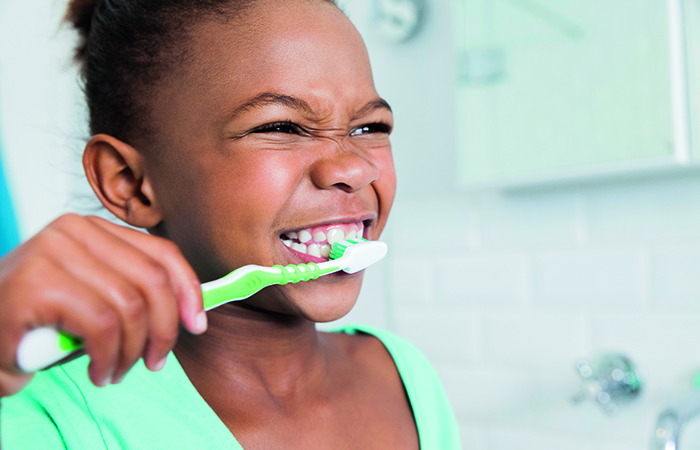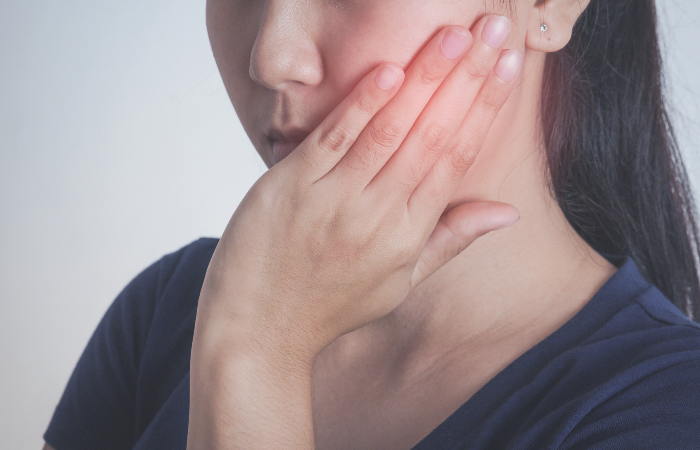Open wide...
In OTC
Follow this topic
Bookmark
Record learning outcomes
The state of the nation’s teeth is nothing to smile about, with epidemic levels of decay in our children and many adults still not following basic oral hygiene advice.
Tooth decay is the number one reason for children's hospital admission. In England, twice as many children were admitted for dental treatment last year as for asthma, according to the Royal College of Surgeons. And although tooth decay is preventable in over 90 per cent of cases, data by the Local Government Association reveals there were almost 43,000 hospital operations to remove unhealthy teeth in children and teens last year in England, an increase of 17 per cent in 2012/13 figures, and at a cost of £36.2 million to the NHS.

It’s not just children’s teeth that are in a poor state. According to National Smile Month figures, a quarter of adults don’t brush their teeth twice daily and 31 per cent have tooth decay.
Root of the problem
In England, there are around 170 operations every day to remove unhealthy teeth in children and teens. Around one in 10 threeyear- olds suffers from tooth decay and 25 per cent of five-yearolds, rising to around half of five-year-olds in deprived areas of the country. This is all at a huge cost to the NHS; children’s tooth extractions have cost the NHS £165 million since 2012, says the British Dental Association.
“The leading contributing factor to this is poor diet, especially frequent and excessive consumption of sugar. Sugar causes tooth decay and when consumed too often it constantly feeds the bacteria which causes decay, meaning teeth are under constant acid attack,” says Karen Coates, dental advisor at the Oral Health Foundation.
A study by the Journal of Public Health also linked decay with diet, and snacking in particular. The study, which looked at 4,000 pre-school children, found that under-fives who snack throughout the day were much more likely to have decay even if teeth were brushed regularly.
“Poor oral health behaviour and education is also a key cause,” says Karen. “Everybody, no matter what age, should brush their teeth for two minutes twice a day with a fluoride paste to protect against decay. However, many people sadly believe that as ‘baby teeth’ are not permanent they do not have to look after them as well as adult teeth. This is not the case and building good oral health from an early age can help to define their oral health in the future.”
Prevention is key
“Many parents have indicated that they turn to pharmacy staff for advice on oral health issues, so they undoubtedly can be key in helping prevent decay in children,” says Karen.
The key is giving the correct educational advice to parents. “Pharmacy staff can offer advice on using the correct brush, with medium-soft bristles, and the right amount of fluoride paste. This needs to be 1,000 parts per million (ppm) up to three years old and 1350-1500ppm from three years. They can also offer dietary advice and share information on how this affects oral health.”
A bad example Unfortunately, adults do not fare much better when it comes to oral care. One in four adults don’t brush their teeth twice daily, including a third of men, and less than one-quarter floss regularly. Brushing only once a day means someone is a third more likely to develop decay.
A study by Brushlink – a smartphone tooth brushing tracker – found that half of adults admit to missing at least a quarter of their teeth when brushing. The study also revealed that six in 10 adults have never been shown how to brush their teeth correctly by a dentist or hygienist.
“There are two main problems for adults in the UK: tooth decay and gum disease,” says Dr Mish Sachdev, chief dental officer at Brushlink. “There are two contributory factors to decay in adults: lifestyle (diet, smoking, drinking) and poor oral hygiene. These also contribute to gum disease, although this can be genetic and exacerbated by health conditions, such as diabetes.” Dr Sachdev says pharmacy staff could get more involved. “A good fi rst step would be for local pharmacies and dental practices to make contact with each other and explore ways in which they could collaborate.”
Rogue's gallery
Here are five of the worst culprits for children’s teeth:
- Fruit juice and smoothies: these are highly acidic and can lead to erosion of enamel and decay if drunk frequently
- Sweets: The worst types are those which remain in the mouth for longer, such as lollipops or chewy sweets
- Chocolate: High in sugar and tend to be eaten between meals
- Cakes and biscuits: These are packed with sugar and often eaten as snacks
- Dried fruit: Sounds healthy, but in fact are high in sugar and tend to stick to teeth.
Common problems – and solutions
Teeth and gums are susceptible to a number of common problems. Here are some of the ones pharmacy teams will often be asked for advice on:
Toothache
Tooth pain is caused by inflammation of the dental pulp and is the most common reason for an emergency dental appointment. If a tooth loses some of its enamel covering, bacteria and hot, cold or sweet stimuli can pass through the dentine layer and cause pain in the pulp area of the tooth. The pulp becomes infl amed as it tries to repair itself. The main cause of toothache is decay, but other causes include lost or loose fi llings, gum erosion and sensitive teeth. The pain can be a dull ache or a sharp pain. Teeth can become hypersensitive and painful to bite on.
Treatment
- Customer should make appointment to see a dentist for examination to find the cause
- Painkillers and/or oral gels can be recommended to reduce symptoms.
Prevention tips
- Visit dentist regularly
- Brush teeth twice daily for two minutes
- Reduce consumption of sugary foods and drinks.
Tooth decay
Around a third of UK adults experience decay each year. On average, adults have seven fillings and almost three-quarters have had teeth extracted.
Decay is the destruction of teeth by bacteria in plaque, which sticks to the tooth surface. The bacteria in plaque thrive on sugars, which create acids that attack the tooth’s enamel covering. Over time, the acid can dissolve a hole in the enamel, which then allows bacteria to get into the dentine layer and cause decay.
Early tooth decay doesn’t usually have symptoms. However, if it spreads to the dentine, the person may have toothache or be aware of a hole in the tooth. It can be sensitive to cold, hot and sweet foods.
Treatment
Regular dental check-ups are the best way to catch decay early and reduce the need for fillings and extractions. If decay has affected the dentine, a filling is needed. If the pulp is affected, it may need root canal treatment.
Prevention tips
- Watch your diet. “Reduce consumption of acidic or sugary foods/drinks and restrict to meal times. Give up or reduce smoking and alcohol consumption,” says Dr Sachdev
- Adopt a good oral health routine.
Bad breath
Halitosis is an unpleasant smell on the breath that others notice, but the individual may not be able to smell themselves. Occasional or temporary bad breath is caused by smoking, strongly flavoured foods, coffee and alcohol. Low carbohydrate diets can cause it as well as some medicines. Dry mouth is a common cause, as reduced saliva causes bacteria to build up.
The commonest cause of persistent halitosis is poor oral hygiene. If teeth are not cleaned well, bacteria break down food and debris on the teeth and this produces noxious gasses.
Treatment and prevention
- “The most effective and quickest way to treat is with a good oral hygiene routine. This should include twice daily brushing with a fluoride paste, well balanced diet and regular visits to the dentist,” says Dr Ben Atkins, trustee of the Oral Health Foundation
- Clean between teeth daily with floss or interdental brush
- Use mouthwash daily and choose an alcohol-free one to avoid dry mouth
- Chew sugar-free gum to increase saliva flow
- Clean tongue daily to get rid of bacteria.
Mouth ulcers
Ulcers are painful sores that can occur anywhere in the mouth. At least one in five people are affected at some time. Ulcers look pale yellow, with a swollen and red surrounding area. They last seven to 10 days and usually disappear without treatment. “[Sufferers] should visit a GP or dentist if an ulcer has been around longer than three weeks, becomes painful or red, or keeps returning,” says Dr Sachdev.
Causes include: biting the inside of the cheek; loose dentures, braces, rough fillings or a sharp tooth; hot or sharp food that cuts or burns inside of mouth; overly vigorous tooth brushing; stress; stopping smoking, and some medications.
Treatment
The best way to treat a simple ulcer is to use a recommend gel, mouthwash, spray or lozenge to alleviate symptoms explains Dr Sachdev. Pharmacy teams can suggest that chlorhexidine mouthwash can help, while steroid lozenges can reduce pain and speed up healing. A protective paste or gel helps cover an ulcer while it heals.
Prevention tips
- Reduce stress
- Improve your sleep
- Eat a healthy, balanced diet.

Sensitive teeth
If tooth enamel erodes and exposes the dentine beneath, a tooth can become sensitive. This can be caused by brushing too hard, especially round the gum line; acidic foods and drinks that can erode enamel; gum disease, which can cause the gum to recede; tooth grinding, which can wear down the enamel layer; and tooth bleaching/whitening can cause temporary sensitivity. “Diet is the main cause, with acids and sugars leading to enamel erosion and sensitivity,” says Dr Atkins.
Treatment
- Toothpaste designed for sensitive teeth can help ease pain
- “Changing diet to keep acidic fruits and juices to meal times will limit the acid attacks throughout the day,” says Dr Atkins
- Teeth can be coated with fluoride varnish or gel to build up protection.
Prevention tips
- “Help to neutralize acids after eating by drinking water, eating a piece of cheese or chewing sugar-free gum,” says Karen
- Using small, circular brushing movements and changing your toothbrush every two to three months can also help.
Gum disease
A build up of plaque and tartar on teeth can lead to inflamed and infected gums. Mild gum disease is gingivitis and not usually serious. Periodontitis is more serious and can cause tooth loss.
Not brushing between teeth is a common cause of gingivitis as plaque builds around the gum line. Most people get gingivitis at some time. “Smokers are especially prone as smoking causes a lack of oxygen in the bloodstream, so the infected gums don’t heal. Smoking causes people to have more plaque and gum disease to get worse more quickly,” says Karen.
Signs include swollen, red gums, which often bleed a little when brushed. Severe gingivitis causes very swollen and bleeding gums when brushed.
Treatment
- “To prevent and treat it, make sure you remove all plaque from your teeth every day,” says Dr Atkins
- “Visit your dental team for a thorough check-up. They will remove all plaque and tartar from your teeth and you will be shown how to remove plaque successfully yourself,” says Karen
- A chlorhexidine mouthwash can help treat it.
Prevention tips
- “A good oral care routine with brushing and interdental cleaning is the most important thing you can do to help prevent gum disease getting worse,” says Karen.
Northern Ireland tooth decay crisis

The British Dental Association (BDA) Northern Ireland is supporting the NI Assembly’s calls for reform of oral health strategy after new fi gures show tooth extractions in under 18s cost the health service over £9 million a year. Last year, 5,122 children were admitted to hospital for removal of 22,699 teeth.
The BDA has called for lessons to be learned from the dedicated programmes in Scotland and Wales that are transforming children’s oral health. The Scottish Childsmile initiative has reduced dental treatment costs by £5 million a year.
Currently Northern Ireland has the worst dental health record for children, with 40 per cent of five-year-olds showing signs of decay, compared with 25 per cent in England.
Tooth decay is preventable in over 90 per cent of cases
